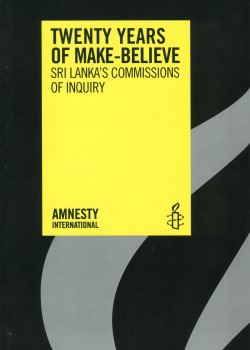
Twenty Years of Make-Believe
Sri Lanka's Commissions of Inquiry
Publisher: Amnesty International Ltd
Place of Publish: United Kingdom, London
Year: 2009
Page Numbers: 66
Series: 9-Jun
Acc. No: 4642
Class No: 323 TWE-SL
Category: Books & Reports
Subjects: Political Science
Type of Resource: Monograph
Languages: English
With this report, Amnesty International seeks to re-focus the debate within Sri Lanka and in the international community from one that is centered on the most recent atrocity or the latest Commission of Inquiry, to one that is based on the need to prevent the continuation of violations and ensure real accountability for past abuses. Sri Lanka's criminal justice system has critical shortcomings that obstruct justice for victims of human rights violations. It is subject to political pressure, lacks effective witness protection and is glacially slow. The system is so degraded that the vast majority of human rights violations over the past 20 years have never been investigated, let alone heard in court. Those that do make it to trial rarely conclude with a conviction; defendants are acquitted for want of evidence; witnesses refuse to testify; hearings are subject to repeated delays; even the prosecution has failed to appear in court in key human rights cases. This is not simply a problem of inadequate resources or institutional capacity (although these too are obstacles), it is a problem of political will. The failure of the formal justice system to check grave violations of human rights has been a focus of domestic and international pressure on the Sri Lankan government for decades. That pressure has sometimes led the government to appoint ad hoc commissions of inquiry to look into particularly high profile cases. These have proved equally ineffective in combating impunity. The Amnesty International calls on the Government of Sri Lanka to i) Demonstrate that it can bring an end to the cycle of impunity; ii) Take measures to learn from past failures and rectify them; iii) Ensure thorough and efficient criminal investigations; iv) Ensure a strong, independent Human Rights Commission; v) End impunity and ensure justice for victims; vi) Initiate changes in the law; vii) Ratify international treaties.



